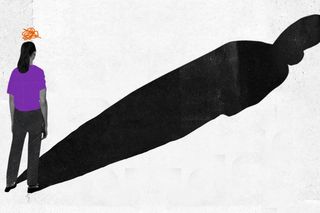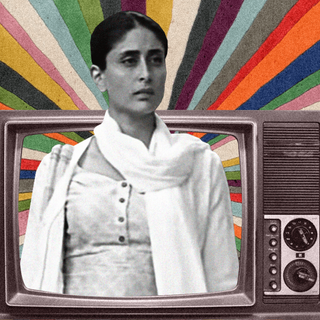
Not Everyone Idolizes Their Parents. Why Do We Inevitably Mirror Them Still?
“For most of my life, I only could see how I’m mirroring the good [aspects]… but after I experienced some life-altering and traumatic events in my personal life, I realized that I was mirroring a lot of bad behavio...

“Oh, my god — I’ve become my father. I’ve been trying so hard not to become my mother, I didn’t see this coming,” Rachel tells Joey in Season Seven of F.R.I.E.N.D.S. While teaching him how to sail, she realizes she had picked up “bossing people around” and “yelling at them” from her father. However, Rachel isn’t alone. Many people are often shocked to discover just how much they mirror the behaviors of their parents without ever having intended to.
It’s understandable that we subconsciously pick up traits we’ve been taught to admire and emulate — like punctuality, honesty, and empathy. But, interestingly, we may also be picking up their behavioral patterns that we actively dislike ourselves. For instance, I’ve grown up hating how little my mother respected my personal space and how often she’d violate boundaries I tried to set with her. Yet, after years of not just being aware of it but also vocally expressing my dislike, I realized I was mirroring her behavior.
“If I haven’t picked up the phone, it means I’m busy and can’t talk… What is calling me 10 times in a row going to achieve?” a guy I was dating at 17 asked me. I was about to start defending myself when I realized it was a behavior I’d picked up from my mother. She’d do the same thing to me when I didn’t receive her calls — leading me to believe it was an “okay”-thing to do until, of course, this incident opened my eyes to the fact it was a manifestation of the same qualities I hated about her.
While people are often able to identify positive aspects of their parents’ behaviors they’ve picked up, they tend to have a blindspot around the negative aspects.
Tanvi*, 35 who has picked up both good and bad aspects of her parents’ personalities, says “Most of it happened unconsciously… For most of my life, I only could see how I’m mirroring the good [aspects]… but after I experienced some life-altering and traumatic events in my personal life, I realized that I was mirroring a lot of bad behavioral patterns too, which were impacting me negatively… Therapy helped me understand how.”
Tanvi is a comedian, and says creating online content on the subject helped her see how many people connected to the phenomenon of mirroring their parents’ behaviors without ever planning — or even intending — to. This is hardly a uniquely Indian phenomenon though; it’s quite universal, in fact.
Related on The Swaddle:
Indian Adults Are Leading ‘Double Lives’ to Avoid Controlling Parents. But What’s the Hidden Cost?
The blindspots that Tanvi and I experienced are often a result of our “unconscious” mind operating to “resist change and perpetuate early parent-child relationships,” explains Beverly Amsel, a psychotherapist.
But in order to understand the role of the “unconscious,” it’s important to understand the concept of “family scripts” we inherit. Essentially, they’re “repeated pattern[s] of behavior… [where] we all play a part like characters following a script in a film or show. And that same script gets passed onto the next generation unless someone takes on the writer’s role and makes a change,” says Nishita Khanna, a psychotherapist. “The chameleon effect has us subconsciously mimicking the mannerisms and behaviors of those around us.”
Through these scripts — “that describe the acceptable ways to behave, speak, and even think” — parents pass down their habits and behaviors onto their kids. When we replicate it — often without even realizing we’re doing so — it can manifest in our cleanliness etiquettes, in the way we serve food and eat, or in the manner we treat people, from friends to colleagues to domestic workers.
“Our parents are whom we spend our formative years with. The primary role models from whom we pick up the blueprint of what is appropriate and inappropriate, our language and speech patterns, rules of engagement, and more. All while we’re still forming our individual personalities… The developing brain creates neural pathways over time like trails in a field when we keep repeating certain behaviors as a child. These solidify and become more marked as we grow up, turning into the path we naturally take,” an article on Tweak India states.
Essentially, in a way, our parents’ behaviors become embedded in our behavior — just like calling people incessantly until they pick up my call became embedded in mine. “When I started living in a hostel, away from [my parents], I saw that there were other students who were doing things differently. That’s when I realized I just was doing whatever my parents used to do,” Daksh*, 23, says.
Holding on to behavioral scripts can unconsciously suggest a form of “loyalty” to our parents too, as Assael Romanelli, a clinical social worker and therapist from Israel, wrote. For many, it also becomes quite difficult to break away from the script even after they’ve been made aware of having picked up traits they hated in their parents.
“[My mother] made me crazy with her anxiety, and now I’m doing that to [my son]. He just graduated, and I insisted he go to a close-by college… I know that was selfish and not best for him. My mother’s worry always limited me. Why didn’t I stop myself from doing the same to him?” Amsel quotes a patient of hers, fictitiously named Ellen, as saying. But, she also adds, “[My son] said he wanted to go away to college. But I know him, and in my heart, I believe he was relieved when I said he had to go to a local school. I think he feels taken care of when I worry.”
Related on The Swaddle:
Many Indian Families Express Care Through ‘Bullying,’ Creating Patterns of Abuse
Explaining her behavior, Amsel notes that even though people like Ellen resented her mother’s treatment of her — and even berates herself for passing it on — her resistance to change makes her want to rationalize it and attribute positive outcomes to behaving negatively. Perhaps, our familiarity with our parents’ scripts makes us feel safer. Moreover, replicating our parents’ behaviors may also help us feel closer to them.
Unfortunately, the adverse impacts of mirroring negative traits of our parents’ behavior — which can include their attitudes too — may also extend to the way we view ourselves. “One behavior that was pointed out to me (by my therapist) was lying to people [when asked] about my disability. I realized that I had been ashamed of my disability just because my parents were, and I had inculcated that behavior… It took [me] time to unlearn that,” Daksh notes.
It’s not just our parents’ attitudes towards us that impact how we look at ourselves. The way our parents viewed themselves, too, influences our self-perception. For instance, if one’s parents try to teach them body positivity, but continue to criticize their own appearances, one may grow up to be critical of their bodies because the idea that some bodies are better than others has been drilled into their minds.
So, naturally, breaking away from toxic traits can become important — not only to protect our own mental health but also to stop passing down negative traits across generations. Just like it was critical for Daksh to stop being ashamed of his disability, Tanvi, too, had to learn how to stop “being there for others at the expense of my own mental and physical health” — a trait she had picked up from her mother.
Therapy helped both Daksh and Tanvi. For many, corrective scripts — that come into being when one “consciously chooses to do things very differently, or even opposite from the scripts they experienced growing up” — serve as the magic wand that relieves them of the weight of their parents’ behaviors.
So, if you find yourself replicating your parents’ behaviors too, it’s not your fault — in fact, it’s only natural. However, what is in your hand is learning how to break away from them once you’ve been able to identify the toxic traits you’ve been mirroring.
*Name concealed to protect identity.
Devrupa Rakshit is an Associate Editor at The Swaddle. She is a lawyer by education, a poet by accident, a painter by shaukh, and autistic by birth. You can find her on Instagram @devruparakshit.
Related


Why Some Images Become Unforgettable
